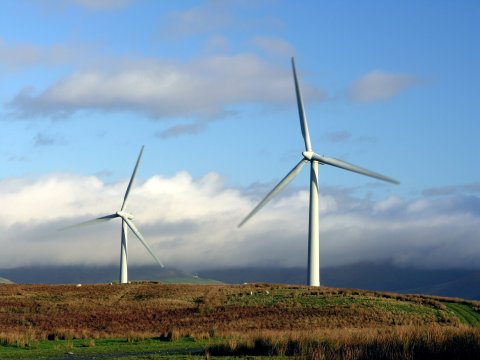
25 July 2024
Today the government announces its plan and new legislation for Great British Energy, a new publicly owned renewable energy generation company. The government has confirmed that Great British Energy will partner with the Crown Estate to boost wind energy across the UK.
It's good that the government is going ahead with the plan for a publicly owned company and investment in wind, but right now it looks like a lot of the benefit will go to private interests.
We are calling on the government to:
- make sure the public benefits from a controlling (50%+) permanent stake in new energy projects
- give UK households a voice on the board of Great British Energy
- buy back British Gas so that cheaper bills can be directly delivered
Great British Energy - what's great about it?
Back in 2022, we told the Guardian that Labour was being too cautious on public ownership and asked the question “Why not set up a publicly owned renewable generation company to drive forward water and wind energy, while creating jobs and boosting the economy?”
We pointed out that 9 out of 10 of the countries leading the way in terms of green transition already have a publicly owned renewable energy company – and our petition to nationalise energy said the UK needs to do the same.
It’s brilliant that the government is setting up a brand new company in public ownership. There are already publicly owned companies delivering well across the UK, like the Met Office, Ordnance Survey, the Land Registry and the Royal Mint.
This is one of Labour’s most popular policies and the tone of the announcement is spot on.
"It should be the British people who own and benefit from our national resources.
Great British Energy will allow us to use resources that belong to all of us, and that should be harnessed for the common good – maximising our public assets, rather than flogging them off.
We already have public ownership of energy in this country, just by foreign governments. At the moment, taxpayers in other countries profit from our energy infrastructure but the British people are missing out."
What's not so great?
Reports from the press suggest the plan is for Great British Energy to lead energy projects through early stages to make them go faster, then give them back to private firms. It will keep a stake in these projects to get a return for the public purse, with the profits from this going back to the government or to invest in future energy projects, but we have no guarantees about the size of this stake compared to the private sector.
This is not the direct public ownership at scale we see in other countries like Norway, Denmark, Sweden, Iceland, France, Switzerland, Austria, Finland and New Zealand.
The BBC says "Eventually, GB Energy may take a controlling interest in some renewables generation projects."
Sky News says that "ministers have left the door open for Great British Energy to become an operator of projects themselves in the future."
The Guardian says: "the company will spend money on activities such as scoping out the seabed and making sure there are connections to the onshore grid to allow private developers to build thousands of new turbines at pace"
There are two ways that money can come back to the public purse through Great British Energy.
- Firstly, profits can be returned to the government when energy projects use Crown Estate land. Most of the profit from the Crown Estate flows back to the Treasury. It can then be used to invest in new clean energy projects. (The Crown Estate already benefits from its portfolio of properties worth £15.6 billion. The monarchy itself gets 12% of the profits so these don't go to the government, and it has recently received an extra £45 million due to six new offshore wind farms.)
- Secondly, the government says it will have a stake in the energy projects themselves and therefore get a share of the profit - but it isn't clear how big the public's stake will be or whether it will be a permanent stake.
We demand that the PUBLIC benefit from public ownership
It is good for government to lead the way, showing that the country is committed to renewable energy and therefore giving private companies confidence to invest on their own account. But we have to be careful - again and again we see a pattern of the public sector taking the risk while the private sector takes the profit. This must not happen with Great British Energy.
If the public stake in new energy projects is limited, profits for the public purse will also be limited, and we will have very little control. The majority of the benefit will flow to the private companies that benefit from OUR "de-risking" for them. How then will this lead to cheaper bills? How will we the public benefit?
Three things the government should do
1) Great British Energy, as a new publicly owned company, should directly build, own and operate renewable energy generation projects at scale. It should aim for a 100% permanent stake in these projects so that the British public can benefit from them 100%. At the very least it should have a 50% controlling and permanent stake in every project.
2) The British public - including households, workers and communities - need a voice on the board of Great British Energy. The government could set up a democratically accountable organisation to represent us, the people who use public services, and we could be involved as this unfolds to make sure the public interest is the priority.
3) The government should buy back British Gas. This is a key missing piece of the jigsaw. Right now households across the UK cannot choose to get their energy from a publicly owned energy provider even though this is normal in other countries like France and Sweden, where people can buy from EDF and Vattenfall respectively. Our new polling out today shows 63% of people want the government to buy back British Gas as the new retail wing of Great British Energy.
Sign the petition if you agree.

Photo credit: Steve Oliver
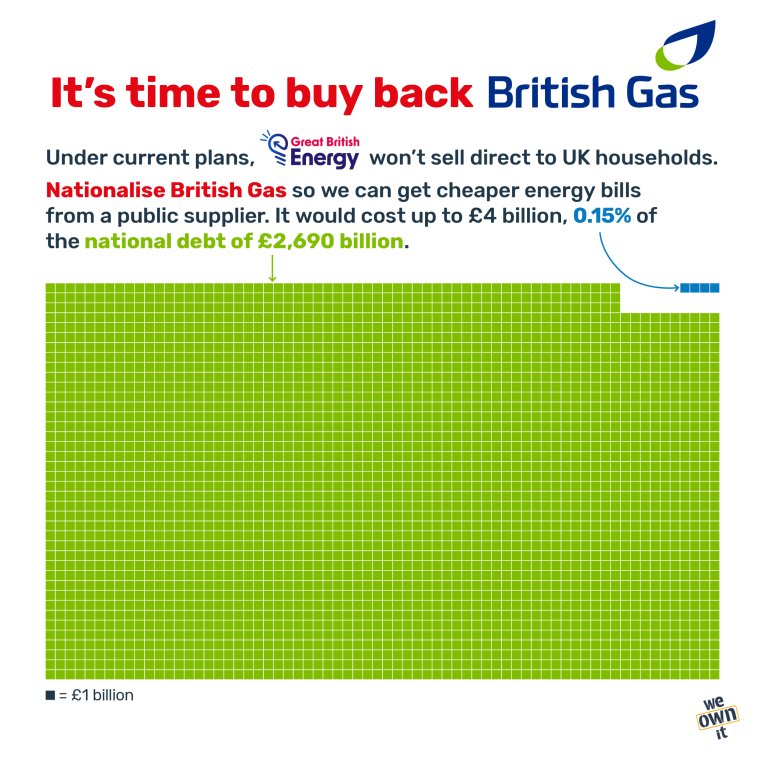





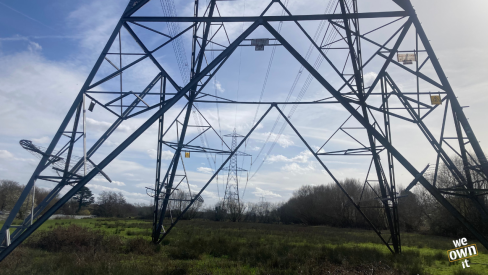
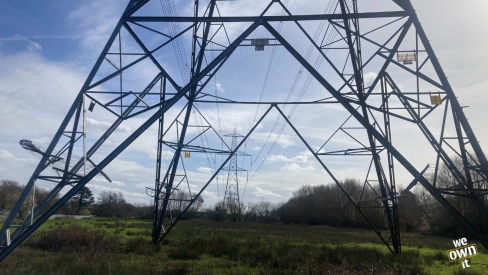
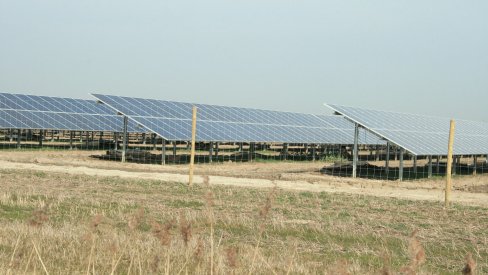



Comments
Sandra Dunn replied on Permalink
Cheaper Energy for All
Richard Cowie replied on Permalink
Energy is an essential for life and as such can't be left to market force's
Vikki Chester replied on Permalink
When driven purely for profit,standards slip. The public need high quality at affordable prices.
Ian Elphick replied on Permalink
Stake retained by Govt. should be at keast 51% to retain a controlling interest, and ensure that a policy decision deadlock doesnt occur.
Mr Alan Polley replied on Permalink
The government should be the owner of the infrastructure of essential supplies and the product to be used then sell/lease out the supply end to highest bidder lowest price contractor thus dictating the market prices and taking the profit before corporate shareholders get their cut those that fail to fulfil their end of the bargain forfeit their contract and are stripped of the right to bid and their assets are returned to public ownership at no cost to the state
Paul replied on Permalink
Totally agree with your article and would like to see public ownership of our gas industry. How do we get around that gas is sold on the open market and where does the money come from to buy back the gas industry?
Mr Barry Kevin Webb replied on Permalink
My e:mail does not work. If you contact me, please do so via TEXT or PHONE only.
We must move towards public ownership. Though we probably need private investment & management for now?
Complete public ownership is the direction we need to go for.
Add new comment